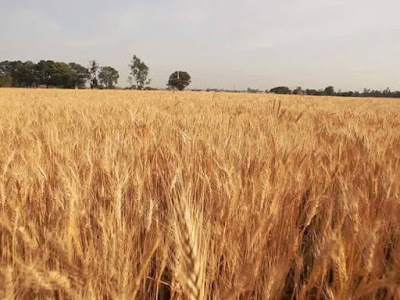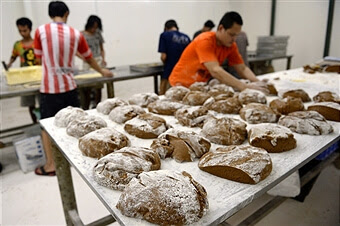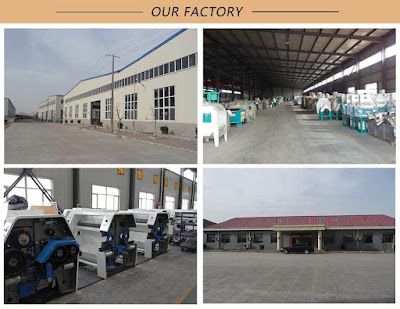Wheat consumption in Indonesia is growing rapidly, supported by an expanding middle class that has taken a liking to western cuisine. Indonesians still eat more rice than most other people in the world, but a fundamental change in the local diet is undeniable, as more and more consumers switch to toast for breakfast, pizza for lunch or doughnuts for dessert. Increasing demand for wheat-based foodstuffs in Indonesia presents exciting opportunities for investment in the wheat milling and food processing industries.
Instant noodles and talking bread
The single main driver of rising wheat consumption in Indonesia is the growing popularity of instant noodles – particularly among young city-dwellers who appreciate the convenience of ready meals. More than half of Indonesia’s wheat flour is turned into noodles. Indonesia is the second-biggest market for instant noodles and home to the world’s largest instant noodle producer, Indofood Sukses Makmur. Trade policies aimed at protecting local farmers against rice imports have boosted domestic rice prices, ironically adding to the popularity of wheat-based instant noodles as a cheap alternative to traditional rice dishes.
Meanwhile, retail chains such as Singapore-based BreadTalk and Indonesia’s J.CO Donuts & Coffee are doing their part to expand the local bakery market, which consumes large amounts of wheat flour as well.
A market dependent on imports
The bulk of Indonesia’s wheat supply comes from Australia, followed by Canada and the United States. The vast majority of shipments are in the form of grain delivered to mills in Indonesia. Wheat grain imports were valued at $2.3 billion in 2012, according to figures from the Central Statistics Agency (BPS). By contrast, Indonesia only bought $188 million worth of wheat flour from abroad in 2012. This still makes Indonesia one of the largest wheat flour importers of the world.
The government aims to limit imports of wheat flour to the necessary minimum. In December 2012 it imposed a 20% temporary emergency tariff to protect Indonesian millers and in the summer of 2013 officials were mulling more permanent measures. Its trade policies put the government at loggerheads with Turkey and Sri Lanka, the predominant exporters of wheat flour to Indonesia in 2012. Turkey has threatened to take WTO action against Indonesia’s flour import policies.
Growth potential far from exhausted
Wheat played an insignificant role in Indonesia until the late 1960s, but since then has been on a rapid ascent. Wheat imports grew from 170 thousand (MT) in 1967 to 6.5 million MT in marketing year 2011/2012, according to data from the United States Department of Agriculture. Per-capita consumption of wheat flour roughly doubled over the past two decades, but at just a little more than 20 kg per year it is only a fraction of consumption in many more developed economies, which highlights the market’s growth potential.
There have been isolated attempts at cultivating wheat in Indonesia despite the tropical climate, but none of those efforts have progressed beyond the experimental stage. The industry will remain fully dependent on imports in the foreseeable future.
Good news for wheat millers
Indonesia’s protectionist stance on wheat flour imports is actually good news for the domestic milling industry, which will require substantial investment to meet future demand for flour. Tapping into this potential, FKS Indonesia, Malaysia’s Malayan Flour Mills and Toyota Tsusho from Japan formed a joint venture, PT Bungasari Flour Mills Indonesia, with a first plant expected to commence operations in West Java in 2014. At the beginning of 2013, Mitsubishi Corporation of Japan purchased of a 10% stake in Sriboga Raturaya, another leading player in the wheat flour sector in Indonesia, in order to tap into the growing market potential. Singapore-listed Wilmar International, for its part, announced the construction of two wheat mills in East Java.
New market entrants in the milling business need to take into account the fact that they are up against competition from well-integrated local players, including the giant Bogasari Flour Mills, a subsidiary of Indofood. On the bright side, the expanding market and the need for more modern and efficient mills should leave room for future growth. The spike in food prices in 2013 should also, in principle, compel the government to ensure a level playing field in the milling industry, which is currently characterized by a small number of companies.
Opportunities in food processing
Further downstream, appealing business opportunities await investors in food processing and retail. While they will hardly displace rice as the country’s staple diet, bread, cereals, biscuits and cakes are carving out growing markets for themselves in Indonesia. The fact that per-capita consumption of these products is still very low means that their growth potential is all the higher. Government officials have been urging Indonesians to diversify their carbohydrate intake away from an over-reliance on rice, but the more powerful force behind changing culinary habits is likely a general westernization of Indonesian food. Foods that do not need cooking, such as breakfast cereals and bread, trump rice when it comes to accommodating the urban lifestyles of office workers.
Sales of bread and pastries rose by 12% to 30 trillion RP in 2012, according to the Indonesian Bakery Association (APEBI). While Jakarta and Surabaya are already well served with bakeries and patisseries, up-and-coming cities such as Medan and Makassar still harbour substantial growth potential. A number of highly successful franchises with strong brand identities point the way to success in Indonesia’s emerging bakery market. Breakfast cereals appeal to Indonesians for their presumed health benefits over rice. Many cereals are still imported to Indonesia and sold at prices significantly higher than in their originating countries. The premium that a small but growing consumer segment is happy to spend on cereals suggests that in-country producers can achieve significant margins and market share.
Due to the fact that sales of wheat-based foods rely to a large extent on middle class consumers, they should prove quite resilient to economic downturns or rising inflation. The growth of the wheat product market in Indonesia, therefore, is a force to be reckoned with for years to come.
Zhengzhou Double-lion Grain & Oil Milling Machinery Co.,ltd. is dedicated in flour mills and flour milling lines design & manufacturing. Cooperating with Henan University of Technology (Former Zhengzhou Grain College) which have abundant talented person and science advantage, it has carried out the new technological research and application of oil machinery, flour milling machinery, coarse cereals machinery and feed machinery, etc., and transformed the latest scientific achievements into productive forces to obtain good social and economic benefit. Many foreign friends have established long-term cooperative relationship with us. Our company has wide milling machines range and competitive price, looking for sales agents overseas!
Need guidance to build a maize flour plant? Please contact us, our engineer will give you professional guidance and suggestion.
Type: wheat flour mill machine, flour mill plants, small scale flour processing plant, corn flour mill machine, grain mill, maize machine. Get in touch with us.
How to Get in Touch with Zhengzhou Double lion Flour Mill Manufacturer
Email: info@zzdoublelion.com
Whatsapp: +8613849022317 (Sophia)
Wechat: +8613849022317 (Sophia)
Add:Lotus street NO.100,Hi-tech development zone, Zhengzhou, Henan, China.
Type: wheat flour mill machine, flour mill plants, small scale flour processing plant, corn flour mill machine, grain mill, maize machine. Get in touch with us.
How to Get in Touch with Zhengzhou Double lion Flour Mill Manufacturer
Email: info@zzdoublelion.com
Whatsapp: +8613849022317 (Sophia)
Wechat: +8613849022317 (Sophia)
Add:Lotus street NO.100,Hi-tech development zone, Zhengzhou, Henan, China.




没有评论:
发表评论